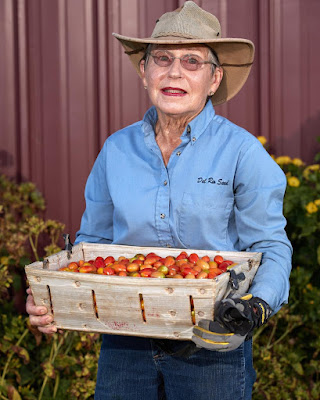
Pioneering farm-to-fork farmer helped popularize heirloom crops

|
|
Suzanne Peabody Ashworth was
instrumental in the growth of Sacramento's
farm-to-fork movement. (Photo courtesy
Del Rio Botanical)
|
Sacramento lost a force of nature with the passing of Suzanne Peabody Ashworth. But many of the rare and heirloom crops that she championed will live on.
Ashworth, who died at age 70 on Dec. 23, grew produce at her West Sacramento farm that was beloved by local chefs and countless diners. Her Del Rio Botanical gourmet organic vegetables became a well-known brand and a cornerstone of Sacramento’s farm-to-fork movement.
A third-generation farmer, Ashworth did a lot more than sell great arugula. She grew more than 1,200 varieties of vegetables, herbs and fruit. Just as important, she kept and shared the seed so others could grow those rarities, too, via the Seed Savers Exchange.
"I've lived here all my life," said Ashworth in a 2009 interview. "I saw the changes, from picking tomatoes by hand to really rock-hard tomatoes that have to withstand being dumped into concrete bins.
"Those changes in the industry affected what's available," she added. "I found myself saying, 'I can't get that anymore.' That's when I got involved with the Seed Savers Exchange. (For example) people could only get three cucumber varieties. But to get others back, you had to save seed. It all ties together."
Ashworth grew varieties rarely seen anywhere else. She filled chefs’ offbeat requests (as well as those from crafters). By preserving the past, she helped secure food’s future.
"I'm not doing anything new," Ashworth explained. "Seed saving used to be something that everybody did. My grandfather did it."
Through the Seed Savers Exchange, Del Rio offered amazing diversity. For example, Ashworth sold seed for 43 varieties of heirloom cherry tomatoes. Her peppers numbered in the hundreds.
Through her seed pursuit, Ashworth became the go-to gourd lady. She sold seed for 75 distinct gourd varieties, a favorite for crafters.
Seed Savers Exchange still offers many of the varieties that Ashworth helped “bring back.” But selling rare seed doesn't necessarily save a species. "We had to create demand," she said. "That's where the restaurants come in."
Ashworth built a demonstration kitchen in her Old River Road home and invited chefs and food pros to dine. Her adjacent dining room sat 20. She cooked what she grew, so she could educate her visitors about the assets of each variety and why these unusual crops were worth celebrating.
"We can get a restaurant's whole staff in here, so they can taste what we're talking about," she said.
Ashworth also developed innovative programs with local chefs such as "Adopt a Squash." Del Rio grew rare squash varieties, including some giants that dated back to the Aztecs. Restaurants adopted and featured those heirloom squash on their menus. The first year, Del Rio sold about 1,000 pounds of adopted squash. The second year, that figure grew to 10,000.
Ashworth also was tremendously generous with other farmers, chefs and women in food. She was among the founding members of the Sacramento chapter of Les Dames d’Escoffier International, the organization devoted to helping women in the food industry.
Alzheimer’s disease stopped this one-woman dynamo way too young. But as she noted, Ashworth planted and grew for the future. Some heirloom varieties still exist thanks to her nurturing.
Besides all her crops, she sowed many seeds of food wisdom including this pearl: Don’t be afraid to grow something different. You might discover a new favorite.
Read Ashworth’s full obituary here: https://www.sacbee.com/news/local/obituaries/article257041087.html
Members of Seed Savers Exchange get free seeds and discounts. Learn more here: https://www.seedsavers.org/ .
Ashworth's 1991 book "Seed to Seed: Seed Saving and Growing Techniques for Vegetable Gardeners" was updated in 2002 and can still be found at used-book sellers online.
Comments
0 comments have been posted.Sacramento Digs Gardening to your inbox.
Food in My Back Yard Series
May 6: Maintain soil moisture with mulch for garden success
April 29: What's (already) wrong with my tomato plants?
April 22: Should you stock up on fertilizer? (Yes!)
April 15: Grow culinary herbs in containers
April 8: When to plant summer vegetables
April 1: Don't be fooled by these garden myths
March 25: Fertilizer tips: How to 'feed' your vegetables for healthy growth
March 18: Time to give vegetable seedlings some more space
March 11: Ways to win the fight against weeds
March 4: Potatoes from the garden
Feb. 25: Plant a fruit tree now -- for later
Feb. 18: How to squeeze more food into less space
Feb. 11: When to plant? Consider staggering your transplants
Feb. 4: Starting in seed starting
Sites We Like
Garden Checklist for week of May 4
Enjoy this spring weather – and get gardening!
* Plant, plant, plant! It’s prime planting season in the Sacramento area. Time to set out those tomato transplants along with peppers and eggplants. Pinch off any flowers on new transplants to make them concentrate on establishing roots instead of setting premature fruit.
* Direct-seed melons, cucumbers, summer squash, corn, radishes, pumpkins and annual herbs such as basil.
* Harvest cabbage, lettuce, peas and green onions.
* In the flower garden, direct-seed sunflowers, cosmos, salvia, zinnias, marigolds, celosia and asters. (You also can transplant seedlings for many of the same flowers.)
* Plant dahlia tubers. Other perennials to set out include verbena, coreopsis, coneflower and astilbe.
* Transplant petunias, marigolds and perennial flowers such as astilbe, columbine, coneflowers, coreopsis, dahlias, rudbeckia and verbena.
* Keep an eye out for slugs, snails, earwigs and aphids that want to dine on tender new growth.
* Feed summer bloomers with a balanced fertilizer.
* For continued bloom, cut off spent flowers on roses as well as other flowering plants.
* Add mulch to the garden to maintain moisture. Mulch also cuts down on weeds. But don’t let it mound around the stems or trunks of trees or shrubs. Leave about a 6-inch to 1-foot circle to avoid crown rot or other problems.